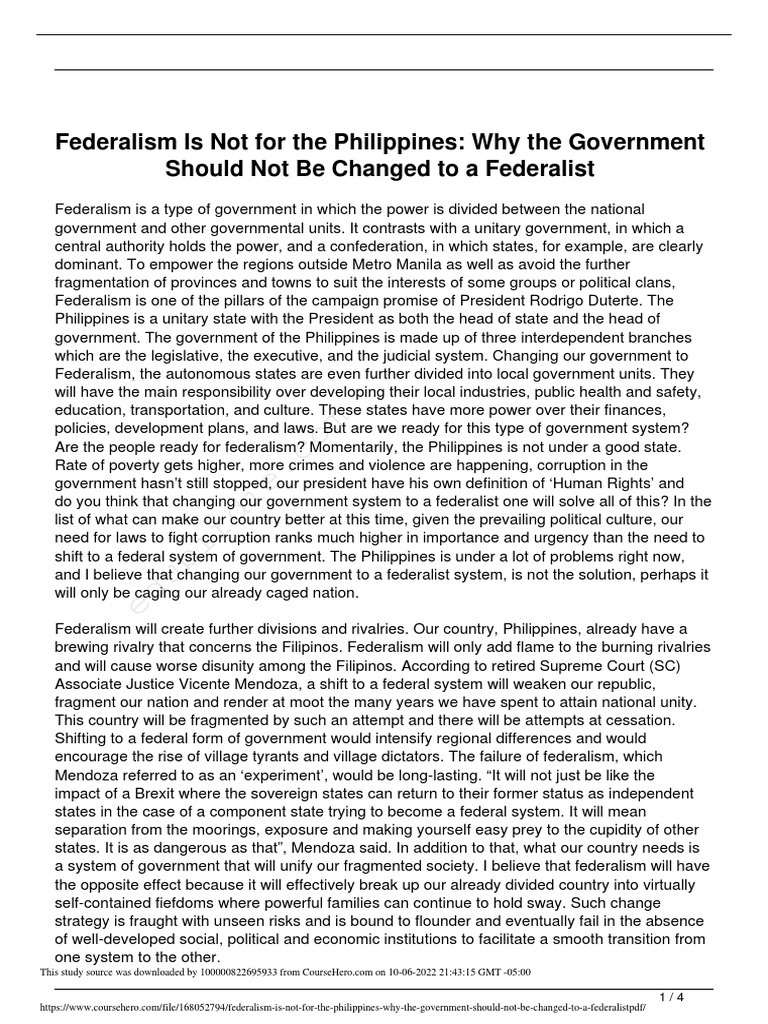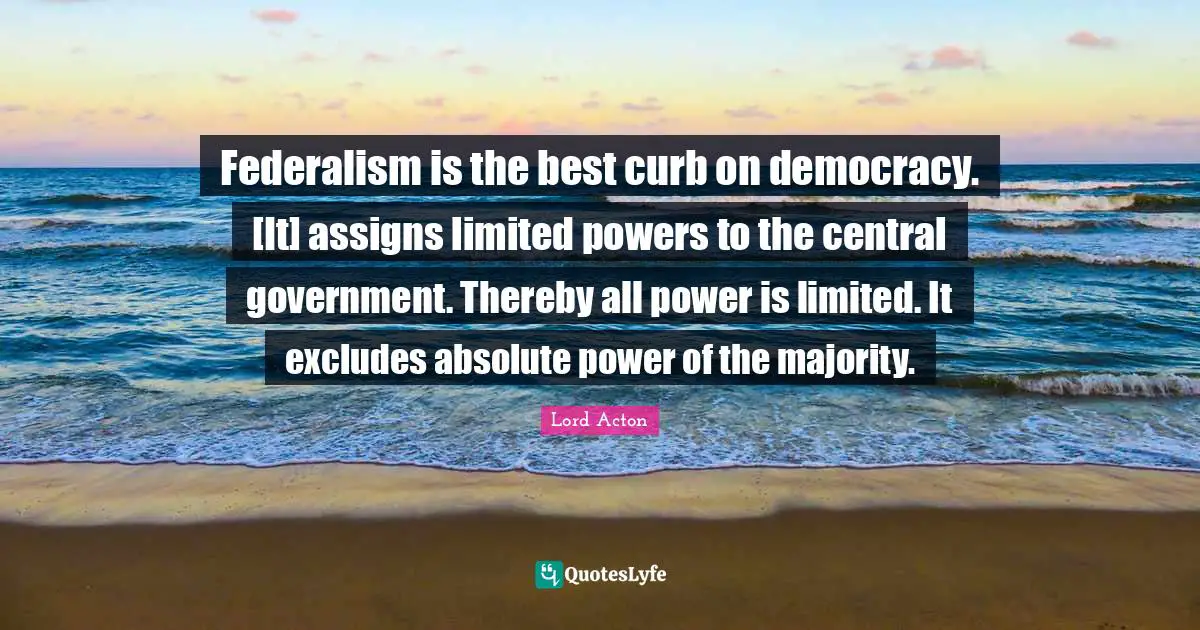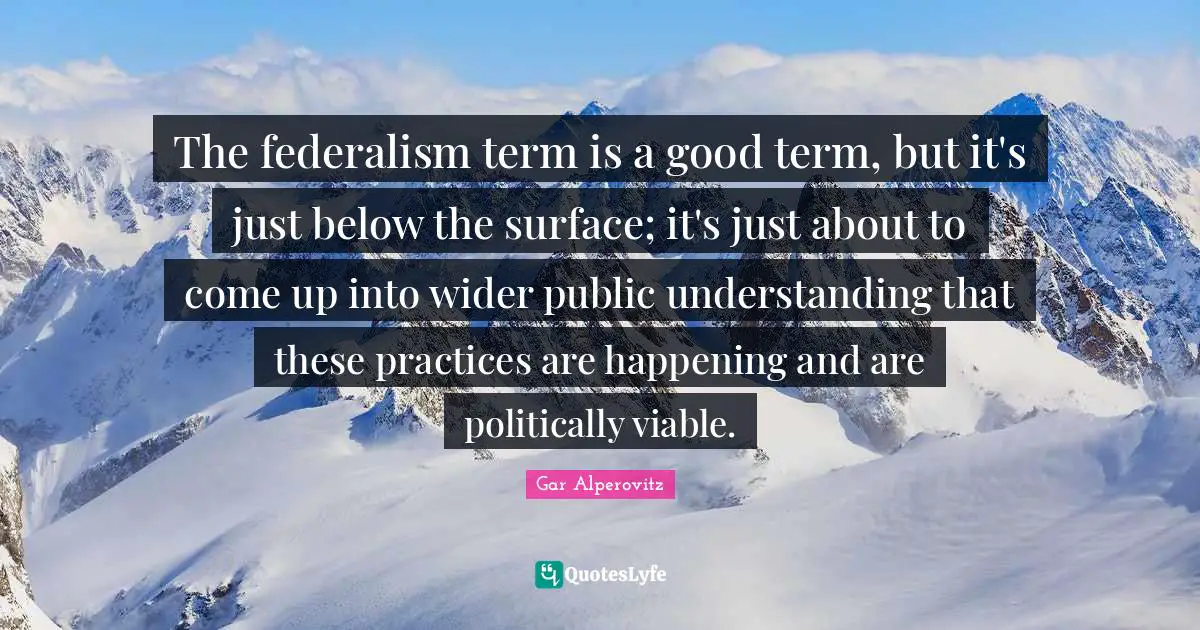Exploring The Power Of Federalism: A Collection Of Inspiring Quotes
Federalism is a political system that has shaped nations and continues to influence governance worldwide. Understanding the principles of federalism can provide valuable insights into how countries manage power distribution. In this article, we delve into the world of federalism through a collection of thought-provoking quotes from leaders, scholars, and visionaries.
Federalism is not merely a theoretical concept; it is a practical framework that governs the relationship between central and regional authorities. By exploring these quotes, we aim to shed light on its significance and complexities. This article serves as a comprehensive guide for anyone interested in understanding the essence of federalism.
Whether you're a student, policymaker, or simply someone curious about governance structures, this collection of quotes will enrich your knowledge and broaden your perspective. Let's embark on this journey to explore the profound impact of federalism on modern societies.
Read also:Misa Campo Net Worth
Table of Contents
- Biography of Key Figures in Federalism
- The Historical Context of Federalism
- Inspiring Quotes on Federalism
- Why Federalism Matters
- Challenges in Implementing Federalism
- Benefits of Federalism
- Real-World Examples of Federalism
- Criticisms of Federalism
- The Future of Federalism
- Conclusion
Biography of Key Figures in Federalism
Notable Contributors to Federalism
Federalism has been shaped by numerous influential individuals whose ideas and actions have left an indelible mark on governance. Below is a brief overview of some key figures who have contributed significantly to the development of federalism:
| Name | Role | Key Contributions |
|---|---|---|
| James Madison | Father of the U.S. Constitution | Advocated for a balanced system of federalism in the Federalist Papers. |
| John Jay | Co-author of the Federalist Papers | Emphasized the importance of a strong central government. |
| Alexander Hamilton | Co-author of the Federalist Papers | Supported the creation of a robust federal government. |
The Historical Context of Federalism
Federalism has its roots in ancient civilizations but gained prominence during the formation of modern nation-states. The concept evolved as a response to the need for a balanced distribution of power between central and regional authorities.
One of the earliest examples of federalism can be traced back to the Roman Empire, where provinces enjoyed a degree of autonomy under the central government. Later, during the American Revolution, the concept of federalism was formalized in the U.S. Constitution, setting a precedent for future nations.
Inspiring Quotes on Federalism
Throughout history, many notable figures have expressed their thoughts on federalism. Below are some inspiring quotes that capture the essence of this governance system:
- "The powers delegated by the proposed Constitution to the federal government are few and defined." – James Madison
- "A nation without a federal system is like a house divided against itself." – Abraham Lincoln
- "Federalism is the sharing of power between national and state governments." – John Jay
Why Federalism Matters
Understanding the Role of Federalism
Federalism plays a crucial role in modern governance by addressing the complexities of diverse populations. It allows for a balanced approach to decision-making, ensuring that both central and regional interests are considered.
By distributing power, federalism promotes accountability and responsiveness in government. It also fosters innovation by enabling regions to experiment with policies tailored to their specific needs.
Read also:Kyle Roskot The Rising Star Shaping The Future Of Entertainment
Challenges in Implementing Federalism
While federalism offers numerous advantages, its implementation is not without challenges. One of the primary concerns is the potential for conflict between central and regional authorities. This can lead to inefficiencies and delays in policy-making.
Additionally, federalism requires a robust legal framework to ensure smooth functioning. Without clear guidelines, disputes over jurisdiction can arise, undermining the effectiveness of the system.
Benefits of Federalism
Advantages of a Federal System
Federalism offers several benefits that make it an attractive governance model. One of the key advantages is its ability to accommodate diversity within a nation. By allowing regions to exercise autonomy, federalism promotes inclusivity and representation.
Furthermore, federalism enhances democratic participation by bringing decision-making closer to the people. This increases civic engagement and fosters a sense of ownership among citizens.
Real-World Examples of Federalism
Several countries around the world have successfully implemented federal systems. The United States, Canada, and Germany are notable examples where federalism has proven effective in managing diverse populations and interests.
In the United States, federalism allows states to experiment with policies such as education and healthcare, leading to innovative solutions. Similarly, in Germany, the federal system enables Länder (states) to address regional issues effectively.
Criticisms of Federalism
Despite its advantages, federalism has faced criticism from various quarters. One common critique is that it can lead to inefficiencies due to overlapping jurisdictions. Critics argue that coordination between central and regional authorities can be challenging, resulting in delays and duplication of efforts.
Moreover, federalism can exacerbate regional disparities if resources are not distributed equitably. This can lead to resentment and calls for reform, highlighting the need for continuous evaluation and adaptation of the system.
The Future of Federalism
Adapting to Changing Global Dynamics
As the world becomes increasingly interconnected, federalism must evolve to address new challenges. The rise of global issues such as climate change and cybersecurity requires collaboration between nations and regions. Federal systems will need to adapt by fostering greater cooperation while maintaining their core principles.
Technological advancements also present opportunities for federalism to enhance its effectiveness. Digital tools can facilitate communication and coordination between central and regional authorities, improving governance outcomes.
Conclusion
In conclusion, federalism remains a vital governance system that addresses the complexities of modern societies. Through a collection of inspiring quotes, we have explored its significance and impact on nations worldwide. Understanding the principles of federalism can provide valuable insights into how power is distributed and managed.
We encourage readers to engage with this topic further by exploring the references provided and sharing their thoughts in the comments section. Your feedback is invaluable in enriching the discourse on federalism. Additionally, feel free to explore other articles on our site to deepen your understanding of governance and related topics.


